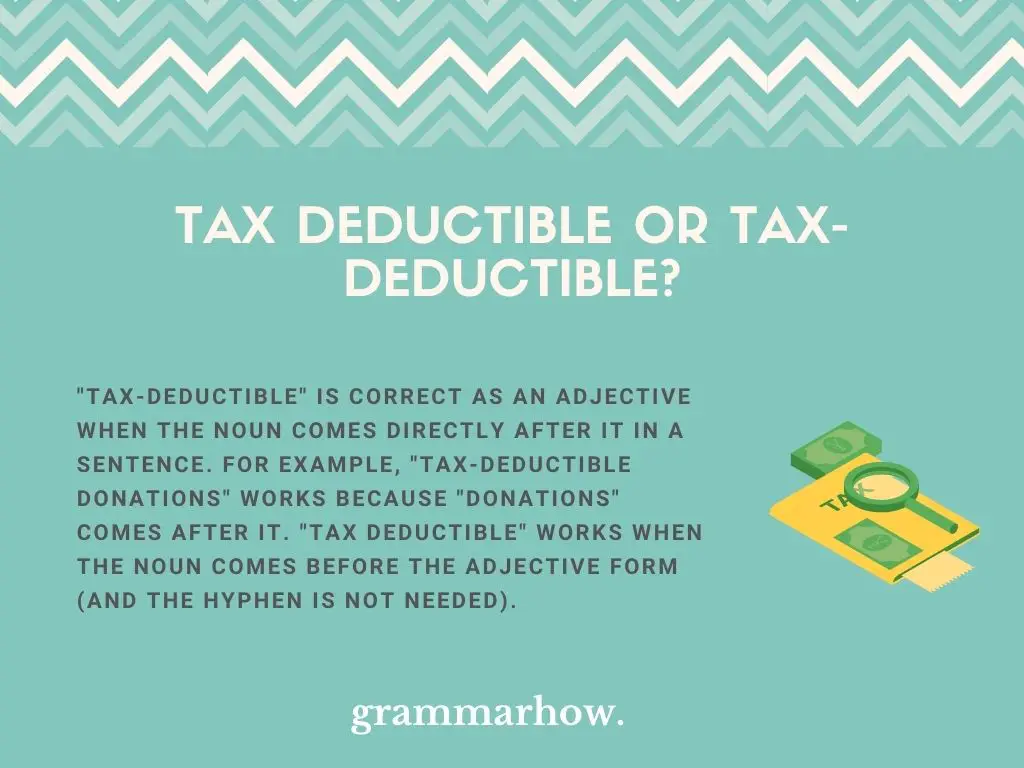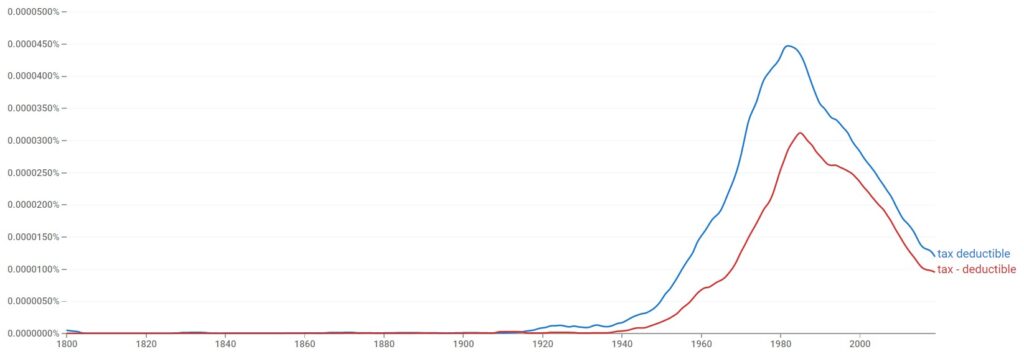“Tax-deductible” works as an adjective and a noun, but there are different spelling variations we need to discuss. This article will go over whether it’s one or two words and how you should know when it can be hyphenated.
Tax deductible vs. Tax-deductible
“Tax-deductible” is correct as an adjective when the noun comes directly after it in a sentence. For example, “tax-deductible donations” works because “donations” comes after it. “Tax deductible” works when the noun comes before the adjective form (and the hyphen is not needed).

According to Google Ngram Viewer, “tax deductible” is slightly more popular, but both forms follow an almost identical trend line throughout common usage in English. This shows us that they’re both correct, and it depends on the sentence structure.

The Cambridge Dictionary and The Oxford Dictionary provide entries for “tax-deductible” as an adjective. They both state that it modifies nouns in sentences, but the examples they provide only cover the nouns that come directly after the word.
There are no examples where the noun comes before, which is why “tax deductible” is not mentioned. Nevertheless, it is still correct.
You might benefit from checking out these examples to see how the differences work:
- Noun before: I do not think any of this is tax deductible.
- Noun after. The tax-deductible contributions are of great value to us!
Tax deductible
We do not need to hyphenate “tax deductible” when it comes after the noun it modifies. This is common in English when you’re following most written rules. Some people would argue with it, but there is no reason to hyphenate an adjective unless it directly affects the next word.
AP Style rules teach us about hyphenation, which we’ll get to in the next section. However, the AP rules mostly cover what happens to compound adjectives when they come before a noun. The rules for hyphenation after a noun are not made as clear.
These examples should help you to understand how the noun placement affects the hyphen:
- If none of this is going to be tax deductible, then I don’t see how we can make a solid business out of it.
- You thought you gave this to me while it was still tax deductible, and now you’ve really messed up the financial plan.
- Whether it’s tax deductible or not is irrelevant to me. I’m just really thankful that you were able to provide this much money for the cause.
- It’s not tax deductible! Please stop asking me whether you can do anything else with it!
Tax-deductible
“Tax-deductible” follows standard English rules, meaning that we hyphenate it when it comes directly before a noun. This is a common trend in writing, and it’s one that many people are used to following. Compound adjectives make it much easier to understand modifications in text.
Again, the AP Stylebook is what we use when understanding hyphens. In it, hyphens are noted as linkers. We can use these linkers to connect one or more words with each other if they all work to modify the same noun in the sentence.
Since “tax” and “deductible” both complement each other in this manner, we must follow AP rules when we want to get it correct.
Check out these examples to understand a little more about it:
- I haven’t seen any of the tax-deductible costs yet, but I can guarantee that I’m not going to be pleased about them.
- He’s made a few tax-deductible contributions to the cause, and we should be grateful for that.
- My tax-deductible income is great, but I’m certain that I can get more out of it if I just work a little harder.
- Whatever I can find from this tax-deductible receipt, I’m going to make sure not to report it to my superiors!
Is “Deductible” Capitalized In The Word “Tax-Deductible”?
You do not need to capitalize either “tax” or “deductible” in the adjective form. Hyphenated forms are treated as one word, so if you capitalize “tax,” you don’t always capitalize “deductible” after it.
You might capitalize both words only when you write them in a title. In this case, if every other word in your title is capitalized, it would make more sense to write “Tax-Deductible” to keep it more in line with the rest of your style.

Martin holds a Master’s degree in Finance and International Business. He has six years of experience in professional communication with clients, executives, and colleagues. Furthermore, he has teaching experience from Aarhus University. Martin has been featured as an expert in communication and teaching on Forbes and Shopify. Read more about Martin here.

